Team-BHP
(
https://www.team-bhp.com/forum/)
-
Travelogues
(
https://www.team-bhp.com/forum/travelogues/)
The destination -- The Disappearing Shiva Temple (Shree Stambeshwar Mahadev Temple)
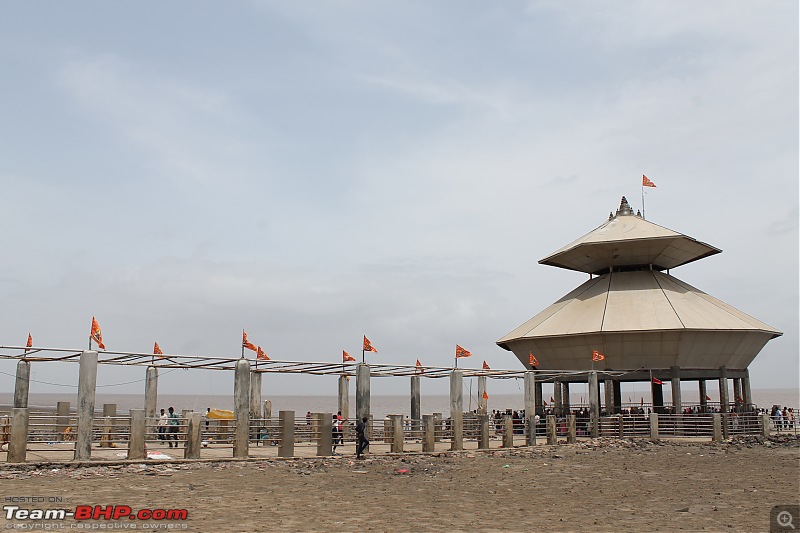
Why -- One of the most unusual Shiva shrines in India
Where -- Kavi Kamboi, Gujarat
Distance -- some 190 km from Ahmedabad (and home)
The temple is 150 years old and is flanked by the Arabian Sea on one side and the Bay of Cambay on the other. We were told that the Shivling can be seen only during low tide. At high tide, it totally disappears, thus earning the epithet 'disappearing temple'. Well, almost. Details about this later.

The familiar expressway. Though it is a pleasure to be on the NE1, the stretch from our house is nothing to write home about. Not that they are bad but driving through the industrial area, wayward trucks and disorganised crossroads is a real pain.

Was expecting a lot of traffic on NE1 since it was the Independence day weekend but surprisingly that was not the case. And, the weather was super warm and humid though there were heavy rains a few days ago. Not a single drop of rain fell during the entire day.

Stopped for tea after NE1. Not a great place. Basically meant for truckers. Ordered tea and had it inside the car.

GPS showed two routes. One was straight through NE1, Padra, bypass Jambusar and through Gajera and Kavi. The other, shorter route, would have seen us exit NE1 midway somewhere near Anand and pass through Mogar and Vasad but join with the first route after Gajera.
We were told not to take the second route because it has narrow and potholed roads and they go through mostly deserted areas. So we stuck to NE1 and once we were out of Vadodara city (which took a lot of time) again we were shown two routes by GPS. That is when this man came to our help. Wifey and kids love corns and we stopping at his cart. He told us not to take the effluent canal road (which the GPS was suggesting) and insisted that we stick to the main road.

But the corn was a dud. Turned out to be very hard due to over cooking/heating. But his advice was total paisa vasool

Never knew Padra had so many industrial units

Industries mean a lot of traffic. There were makeshift teashops too, with the usual crowds and all sorts of vehicles parked haphazardly
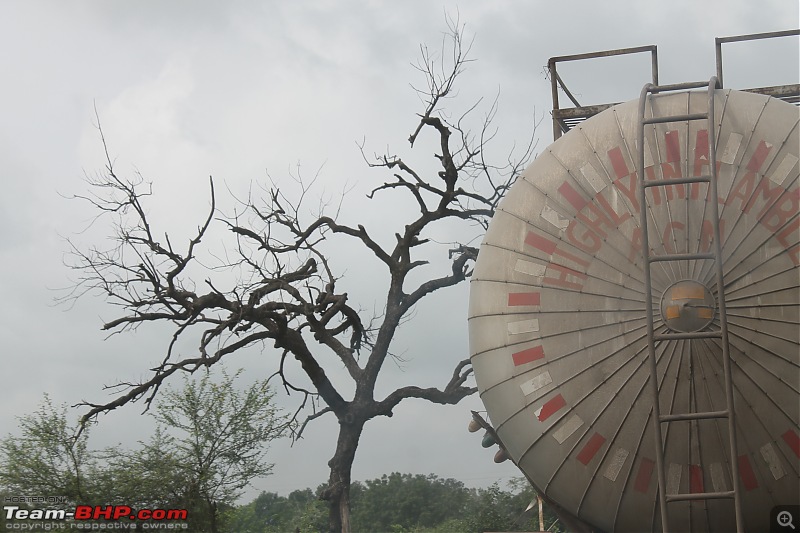
And yes there were trucks and tankers too

It is a given that Gujarat is an industry-friendly state. But seeing industrial units of all sizes and shapes and names known and unknown one after another on a single stretch was indeed exhilarating.

Once the industrial belt got over we entered a totally different terrain. And that was what we were waiting for all the while

The roads were narrower but excellent barring a small stretch, and both sides were painted in rich green probably due to the rains

This was an absolute jawdropper -- a perfectly pruned and shaped green canopy that is capable of leaving anybody in complete awe of mother nature

Met this small flock of white beauties. Slowed down and drove alongside them for a while. Guess they may have wondered which one is the fairest of them all -- the car or one from their flockstupid:

No road trip is complete without an encounter with simians and this one too wasn't different. The monkeys were along the road and took their own sweet time to cross over.

We were totally engrossed in the sights and sounds that competed for our attention all the way so much so that we didn't realise that we reached our destination

We had set out at about 6.15am and reached the temple by 10.30am. It was warm and humid outside.

The sea was far away, probably the water receded early in the morning.

We were told that by noon or so, during high tide, the water will return and submerge the whole temple. During low tide, the water recedes, mostly by evening, and the temple emerges from sea. Pooja is held during this time. The sea water is muddy and the whole temple is washed and cleaned once the water recedes.

The entry to the temple. The high tide and low tide are pronounced during full moon (purnima) and new moon (amavasya) and one can expect higher water levels. This was gleaned from the policemen and others working in the temple.

That's family trying to dodge other devotees/visitors while posing for a pic . There were people selling flowers and vegetables, yes vegetables, along the path
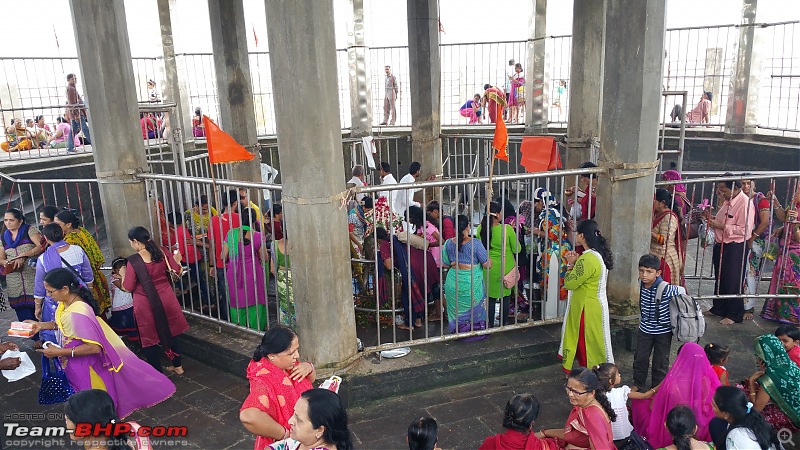
The queue wasn't that big, and a sea of colours and the chant of hymns prepare you for the darshan and pooja

There were separate queues for women and men and things were pretty organised

The Shivling seen here. A small rudraksha is given as gift to everyone

That's the rush for prasad and it took us about half an hour (more than the time we spent in queue for darshan) to buy some

The darshan and pooja done, it was time for us to see the temple's disappearing act. Looked around for a perfect spot from where we could see the water gushing in
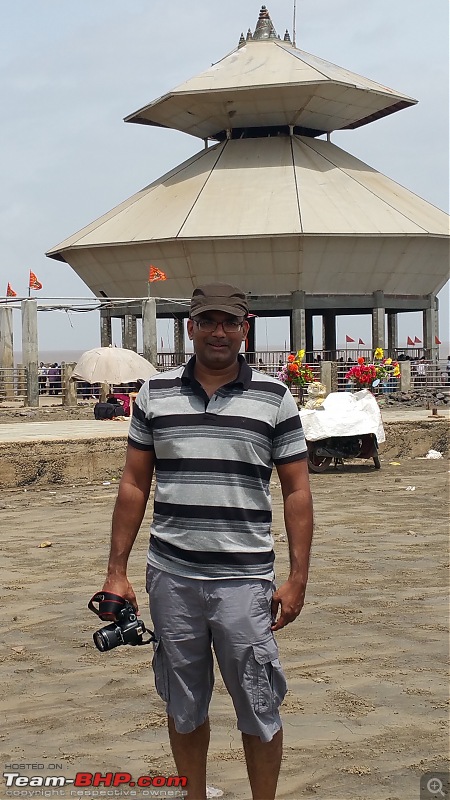
I was the odd one out there, mainly because I was dressed casually as a tourist while all others looked and behaved like true devoteeslol:

Finally found a place to wait and see the spectacle. It was really hot and we knew we won't be able to stay there for long

The progress was very slow but it was happening
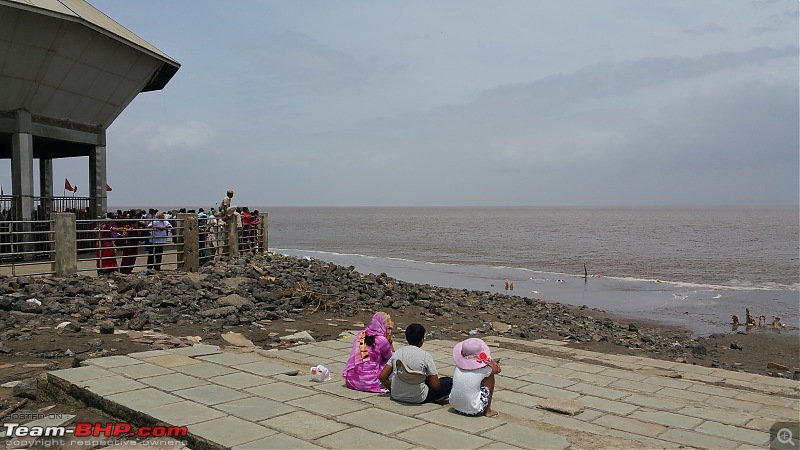
As you can see the water has come closer to the temple

It is much more closer now

A little more

and a little more. And that was it. We didn't have any more patience left to wait in the blazing sun and decided to give up

The ramp which stretches from the main road to the shoreline. Nobody there could explain its relevance

A view of the shore

And this was what we missed. This picture was taken by a colleague who visited the temple a few days later. He had arrived in the afternoon to see the temple fully submerged and stayed put till night to see the water recede
https://www.youtube.com/watch?v=abcfrP8zLuY
A video from the temple's official website
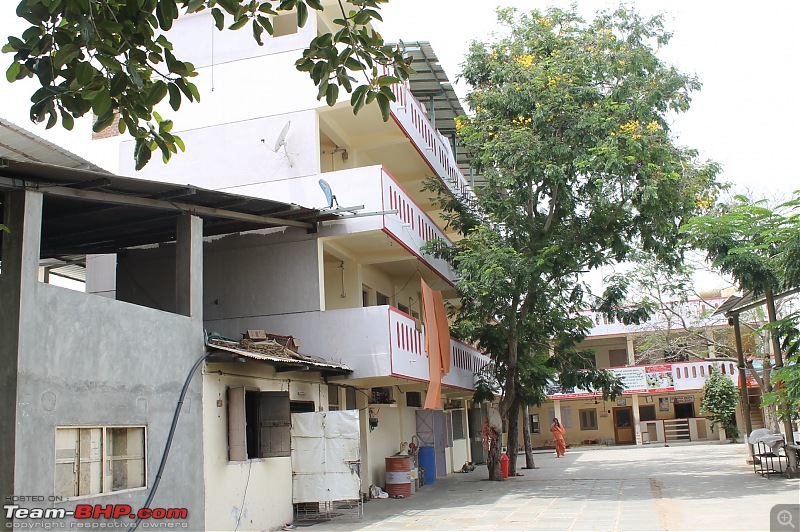
Bang opposite the temple is an ashram and instead of calling it a day we decided to explore
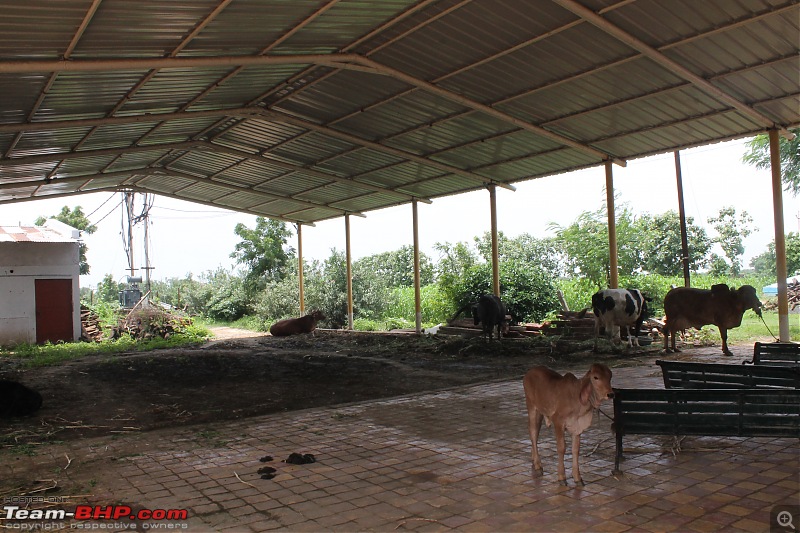
A cowshed in one corner of the premises

Once inside the ashram you immediately notice that the hot and humid weather has become very pleasant

Common facilities include a very basic washroom, a fairly large wash area, a dining area and plenty of drinking water

Accommodation is available. For Rs 500, five people can stay overnight in this room. Saw the facilities just to see how good they are

The large foyer. Doesn't just bring in fresh breeze but also helps in storing veggies and other items

The dining area seen from the first floor. The ashram provides food free of cost. It's the only option there that gives you a full thali, complete with a sweet dish

Also had an opportunity to meet the Swamiji and listen to him for a while.
We left by 1.30pm or so, not knowing what was waiting for us if we had stayed back till the evening.
Well, there is always a second time:D
Thread moved from the Assembly Line to the Travelogues Section. Thanks for sharing!
The bottom pillar must be - what - 3 or 4 m tall Plus about 1 m of elevation ... Never realized that a tide can be that high!
Guess that is why the temple is very unusual.
There is one more temple with similar characteristics in Gujarat, somewhere near Bhavnagar. Waiting for kids' exams and the hot and humid weather to get over.
Had been to Kavi Kamboi twice in last 2 years I guess. Drive is fantastic, but the road nearing towns isn't exactly good. But as one starts nearing the sea, roads improve with green farms on both sides ( depends on season ).
Both the time I reached the place in afternoon where the tide was low. But when high tide comes, its becomes scenic. Best part is when one can look at open sea just before final left turn towards temple. Fact that car can be taken right to the temple walkway helps in case elders are traveling. No parking hassle too. Worth a day's drive and break from busy, tense schedules. Those who are traveling in winters, take a note that by evening, its becomes quite cold ( w.r.t Gujarat weather which is normally quite hot ). Caught cold after roaming on beach for long hour in winter season when I first visited. Guess I didn't have much experience of such open beach in winter.
I think the other temple is around 10 kms. from Bhavnagar, had been there too quite a while ago.
Quote:
Originally Posted by aaggoswami
(Post 4060635)
but the road nearing towns isn't exactly good.
Those who are traveling in winters, take a note that by evening, its becomes quite cold
|
Roads were generally good. A small stretch had potholes but were manageable since traffic was thin and one could easily manoeuvre out of trouble.
Yes it could get very hot and humid during summers and cold during winters. Planning to go again once the winter sets in.
How is the bhavnagar temple? Is it worth a visit?
Quote:
Originally Posted by sreepathy
(Post 4060756)
How is the bhavnagar temple? Is it worth a visit?
|
The one in Bhavnagar is called Nishkalank Mahadev Temple and it is located at Koliyak about 25 kms from Bhavnagar city. The temple is smaller than the one you have visited but it is a little further into the sea. You have to walk about 200-300 metres from the beach towards the sea on a low tide. (Watch out for tiny crabs while you walk to the temple at low tide! No paved footpaths). Since the temple is located at the mouth of the Gulf of Cambay, the tides are very irregular and the place is infamous for sudden decrease and increase in tides (consult locals before stepping into the shallow waters). On a high tide, the entire temple is submerged in water with only the flag visible. I would suggest not going on the day of a full moon night to avoid pilgrim rush. I hope this helps.:)
Thanks buddy. Yes I have heard that it is smaller than Stambeshwar Mahadev temple. As you know, temples like Ambaji, Shrinatji etc are the more popular ones but the unexplored like Stambeshwar and Nishkalank offer better satisfaction, whichever way you see it.
Quote:
Originally Posted by sreepathy
(Post 4060925)
Thanks buddy. Yes I have heard that it is smaller than Stambeshwar Mahadev temple. As you know, temples like Ambaji, Shrinatji etc are the more popular ones but the unexplored like Stambeshwar and Nishkalank offer better satisfaction, whichever way you see it.
|
Definitely! In case you are planning to go to Nishkalank Mahadev anytime soon, I think you should know that the roads from Ahmedabad to Bhavnagar are in really bad condition and the amount of cargo traffic on that road makes it even worse. Personally, I would avoid driving at night on this road for safety reasons.:)
I don't drive at night if it is possible. Been on the the Bhavnagar road a couple of times. It is quite unlike other roads in Gujarat. And yes, there will be a lot of cargo traffic.
Since the monsoon is over I hope they'll fix the roads soon:Frustrati
Nice log! Gulf of Khambat is known for low and high tides. The other side of the gulf has the "Nishkalank Mahadev", where you need to walk about a km into the sea during low tide. The place gets filled up mostly by evening during high tides.
| All times are GMT +5.5. The time now is 14:39. | |













































